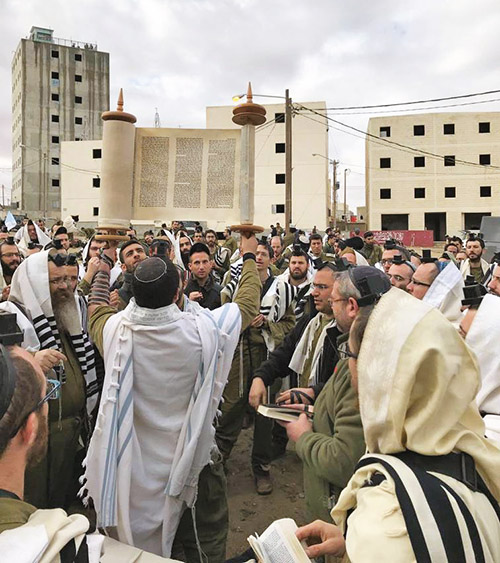
Imagine you got an invitation to a summer camp reunion. You would likely think that it would be a fun get together with old friends; it would include a nice dinner, photos, and stories from your youth. Now imagine this came with a twist—the reunion is being held in your old camp. Once you arrive, you are expected to pitch a tent. For dinner you are going to grill hot dogs in a fire pit. After waking up the next morning you will find out that Color War has started, and you are participating in the tug-of-war match against the blue team. Your only means of communication with the outside world is the weekly letter you mail home. It won’t take long before you wonder if you just entered a bizarre time machine. This is what happens to thousands of Israelis when they get the call.
A few months ago I got the call. It is the same familiar call that comes about once a year. Many of the men who get this call dread it while others love it. As a general rule, wives across Israel hate it as it means they are on their own for an extended period of time. This is the call to miluim (army reserve duty).
It is well known that the Israeli army has a mandatory draft. While there are some exceptions, most soldiers join the army at the age of 18 years old, once they have completed high school. What isn’t as well known is that for many men and a small number of women, military service doesn’t end when they are discharged. In practice, soldiers get transferred from an active unit in the standing army to a reserve unit.
The idea of a miluim unit is fascinating. Most of the time, the unit is inactive and those who make up the unit have normal civilian lives. Some are students and others work regular jobs. Many are married with kids. On a typical civilian day, army life doesn’t come to mind. However, once we get that call, everything changes.
Miluim is a fundamental part of the military and economic doctrine that Israel needs to survive. Shortly after the establishment of the state, two things became clear. The first is that Israel needed a large military to protect itself from hostile enemies. The second is that there weren’t enough young men to fill its ranks. Theoretically, the problem could have been solved by having soldiers serve until their mid- to late-20s; however, this solution is problematic. No democratic country wants to have mandatory army service for that long. Society needs its men to seek higher education, work and start a family. Otherwise the nation risks an economic catastrophe. Therefore, the military establishment came up with a clever idea: have an army composed mostly of reservists.
A look at Wikipedia will show that the IDF has 169,500 troops in its active army. This ranks as the 29th largest military in the world. Its 465,000 reservists rank 13th overall. When the active and reserve numbers are combined, Israel has one of the top 20 largest militaries in the world. A critical deterrent for Israel’s enemies is the knowledge that hundreds of thousands of troops can be mobilized in the blink of an eye.
There are three situations when one might be called up for miluim. The first is war. Everyone knows that once this order comes, you pack your bags and quickly report to duty. The second type of reserve duty is for training. This is vital for both unit cohesion and so that everyone knows what to do in combat. Training, which usually lasts a week, is physically demanding as the commanders want to know the soldiers’ limits. The third kind of reserve duty is front line service. This occurs when a regular unit that serves in a given region gets time off and needs to be replaced. This kind of Miluim can last up to a month.
My most recent call was for frontline service. For the upcoming month of February I will be stationed north of Jerusalem. We will do guard duties, foot patrols, checkpoints, arresting terrorists, and of course clean the kitchen. When I report for duty, I know what to expect. The world suddenly becomes olive green. I will find myself getting a kitbag full of army gear, an M16 and I will head off to the shooting range. We will do several days of drills to reacclimate ourselves. The officers will give us lessons on any new rules of engagement. For me, the moment it sinks in is that first night when I am back inside a sleeping bag on a junky cot. I will think of how the whole surreal experience is a blast from the past.
While I find meaning in being called up for miluim, it isn’t easy for everyone. My wife, who will be six months pregnant at the time, will need to hold down the fort at home. This is, of course, a major challenge as she will need to take care of everything. Women like her are the real heroes since they enable it to happen; without their emotional and practical support it wouldn’t be possible for reservists like me to continue protecting the country.
David Weiss is native of New York and has lived in Israel since 2008. He served in the IDF from 2008-2010 and lives in Karnei Shomron with his wife and three sons.













